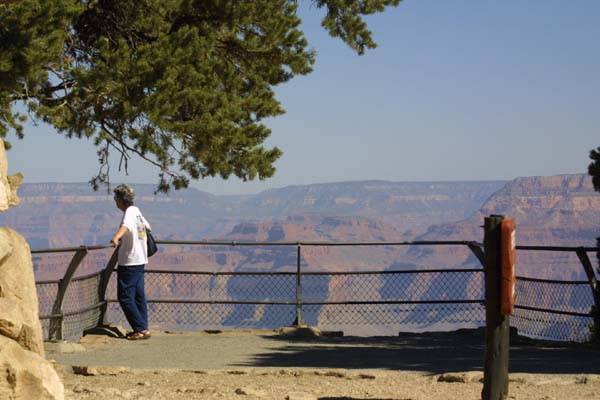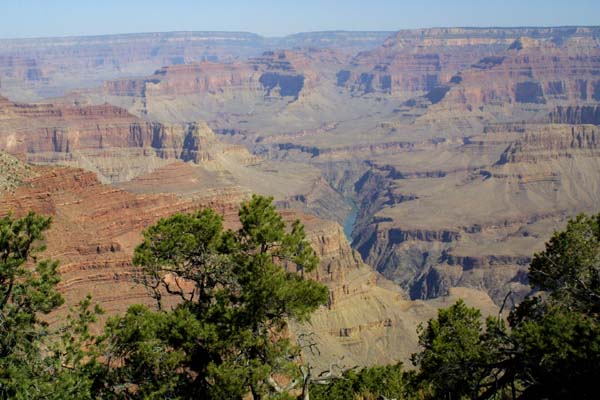
|
Our mules await. It is early in the morning, and these animals are
already up and saddled. This is one of the prime Grand Canyon experiences.
I didn't go. Most mule riders are inexperienced tourists, so these animals
(and perhaps the guides as well) have to be carefully selected for patience,
and temperament. |

|

|

|

|
Various views of the Bright Angel trail. The view above is looking
down on the trail from the rim above, while the views below, and to the left
are taken from farther off, showing how the trail twist and turns it's way
down. The one mile descent takes seven miles of switchbacks to traverse. |

|
Looking like a scar on the face of the canyon wall, the Bright Angel
trail twists back and forth. |

|
Stopping along the path from Piva Point to Hermit's Rest, provided
this great view of the canyon. Many similar views, and much scenery are missed
by those who take the shuttle busses from point to point, rather than using
the rim walk. Though perhaps it is not such a huge loss. Scenic views and
awe inspiring vistas are hardly in short supply here. |

|

|
This is a California Condor. Actually, this whole series of photos
is of a condor flying over the canyon. From this distance, particularly at
this angle, it is easy to confuse this bird with the very common raven of
the area. |

|

|

|
The condor is pretty easily recognized, at a distance, by the white
markings under it's wings. Closer scrutiny will also reveal the oddly shaped
red head, though this can not be discerned from a distance. Condors are
sometimes confused with ravens, large numbers of which live in the park..
Though the condor is a much larger bird, distance can often be difficult
to judge. |

|
My last view of this particular condor in flight. Seen in profile,
the proportionally small head, and under wing markings are obvious. |

|
Mid day begins to cast shadows, and throw the rocks into relief. Haze
emphasizes the distance of some of the far off formations. Unfortunately,
some of the haze is caused by fires burning far off in Arizona, New Mexico,
and Colorado. This was a bad summer for fires. |

|
Down the hard cliffs, little slopes of rubble accumulate into permanant
structures. This is called a talus, and is seen all over the Southwest,
but nowhere are these as large as at the Grand Canyon. The tiny, spire like
peak atop the much broader base to the right of the photo is the result of
softer rock on top of much harder substances. |

|
The typical red stepped faces of the Grand canyon. To the left is
the canyon wall. the structures out on the canyon were all once part of
the rim, before erosion isolated them. |

|
A view from the over view, shown below, at Hermit's Rest. |

|
The End of the trail, at Hermit's Rest. This is as far west as the
busses run, though there are trails going farther. Only a very small portion
of the rim is served by busses, facilities, or well marked trails. To actually
hike along the entire South Rim, is quite an adventure, and would take days. |


|

|
More views, in various directions, from the "porch" at Hermit's Rest. |

|
The entrance to Hermit's Rest, with it's huge Fireplace. No, that
is not the original hermit in the door way, though he certainly looks the
part. |

|
Hermit's Rest. |

|
The bowl of a huge amphitheater forms itself near the western edge
of the developed portion of the rim. |

|
The relief of shade, is a very welcome thing our here. The temperatures
are high, but the humidity is so low (often in the single digits, as it
was during our visit) that you can become overheated and dehydrated without
knowing it. |

|
A view of a tiny portion of the Colorado River as it snakes through
the lower channels of the canyon. This view, near Hermit's Rest, is one
of the few places where the river shows itself. |

|
This dilapidated trail, was built in the twenties as a road for automobiles.
The occasional piece of pavement can still be found. The road was closed
in the forties, and allowed to go back to nature. |


|

|
Trees frame part of the canyon floor, and a bit of the river peeking
out at me. |

|
The semicircle of the amphitheater reminds me of a hanging valley,
but there is certainly no glacial activity here. |





